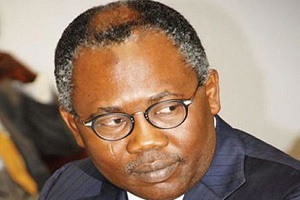A former Attorney-General of the Federation (AGF) and Minister of Justice, Mohammed Adoke (SAN), has said he cannot be held responsible for carrying out presidential directives while he was office.
On Wednesday, an Abuja High Court had ordered the arrested of Adoke; former Minister of Petroleum Resources, Dan Etete, and others, over the controversial OPL 245 deal executed by the federal government in 2011.
The six are named in the charges filed by the Economic and Financial Crimes Commission (EFCC) in relation to the Malabu Oil scam.
Speaking through his lawyer, Femi Oboro, the former AGF said as an aide, he merely carried out the directives of President Goodluck Jonathan who appointed him.
He described the warrant of arrest issued by the court as unlawful.
The former AGF said a court had earlier ruled that he could not answer for carrying out directives of Jonathan.
“The order came as a surprise to our client considering the fact that the Federal High Court, Abuja, presided over by Justice B.F.M Nyako had in Suit No. FHC/ABJ/CS/446/2017, given a reasoned judgment granting to our client the following declaratory reliefs:
“The involvement of the plaintiff in the negotiations leading to the implementation of a settlement agreement dated November 30, 2006 between Malabu Oil and Gas Limited and the Federal Government of Nigeria and the eventual execution of Block 245 Malabu Resolution Agreement dated April 29, 2011 between the Federal Government of Nigeria and Malabu Oil and Gas Limited was in furtherance of the lawful directives/approval of the president in the exercise of his executive powers.
“The involvement of the plaintiff in the negotiation and eventual execution of the Block 245 Resolution Agreement dated April 29, 2011 between the Federal Government of Nigeria and Shell Nigerian Ultra Deep Limited; and Nigeria Agip Exploration Limited; and Shell Nigeria Exploration and Production Company Limited, was in furtherance of the lawful directives/approval of the President in the exercise of his executive powers.
“Any correspondence/instruction to JP Morgan or any other entity and ancillary actions and processes taken by the plaintiff in furtherance of the implementation of the settlement agreement dated November 30, 2006; Block 245 Malabu agreement dated April 29, 2011; Block 245 SNUD Resolution Agreement dated April 29, 2011and Block 245 resolution dated April 29, 2011were in furtherance of the lawful directives/approvals of the President in the exercise of his executive powers.
“The plaintiff cannot be held personally liable for carrying out the lawful /approvals of the president while he served as a minister of the government of the federation.”
Oboro accused the EFCC of concealing the existence of the judgment of the Federal High Court, Abuja, exonerating his client from all criminal allegations concerning the OPL 245.
“Since the criminal charges filed by the EFCC before the Federal Capital Territory High Court of Justice, Abuja, are based on the same facts before the Federal High Court, Abuja, our client expected that in line with the time tested traditions of prosecutorial agencies all over the world, the EFCC and or, the AGF who was a party to the suit before the Federal High Court Abuja, would take immediate steps after the judgment of the Federal High Court to withdraw the criminal charges or apply to court to strike out the name of our client from the charges,” the lawyer said.
“It is even more worrisome that the EFCC concealed this vital information of the existence of the judgment of the Federal High Court Abuja exonerating our client from all the criminal allegations made in respect of the OPL 245 Settlement Agreement of 2011 from the court in their application for the warrant of arrest especially the declaration that our client ‘bears no liability for obeying the lawful directives/approvals of the president of the Federal Republic of Nigeria.’
Adoke had earlier said he would fight the order in court because he had already been cleared of any wrong doing by a “competent court of law.”
Source: THISDAY













